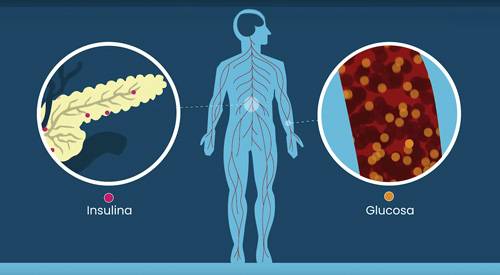Diabetes mellitus type 2
"For those with non-insulin-dependent (type 2) diabetes, following a meal plan will help you maintain a correct weight and achieve a balance between the insulin your body releases and your diet".
DR. JAVIER ESCALADA
DIRECTOR. ENDOCRINOLOGY AND NUTRITION DEPARTMENT

Type 2 or non-insulin-dependent diabetes mellitus accounts for 80-90% of diabetes cases. It produces metabolic disorders characterized by an inappropriate elevation of blood glucose (hyperglycemia), which leads to chronic complications due to the involvement of large and small vessels and nerves.
It can cause metabolic syndrome, which increases cardiovascular risk and is a cause of death. In this syndrome are associated diabetes, high blood pressure, increased levels of cholesterol, triglycerides and / or uric acid and overweight.
The treatment of type 2 diabetes is based on three fundamental pillars: follow a balanced diet plan, practice regular physical exercise and personalized pharmacological treatment.
The Clinic has the only cardiovascular checkup that incorporates the highest diagnostic technology by image to accurately quantify your cardiovascular risk
Thanks to the exclusive dedication of our professionals, they allow us to perform the ICAP Checkup in less than 48 hours with a high precision diagnosis.

What are the symptoms of type 2 diabetes?
Type 2 diabetes is virtually asymptomatic in the early stages.
This means a delay in its diagnosis, even of several years, and it is estimated that up to 50% of people with type 2 diabetes mellitus remain undiagnosed at this time.
This means that up to 20% of people with this type of diabetes show signs of complications at the time of diagnosis.
For this reason, type 2 diabetes mellitus must be specifically sought out in people at risk, that is, anyone from the age of 45 and under with diabetes mellitus:
- Obesity.
- Family history of diabetes.
- Diabetes during previous pregnancies or children with birth weight over 4 kg.
- High blood pressure.
- High cholesterol or triglycerides.
- History of blood glucose disorders
Do you have any of these symptoms?
You may have type 2 diabetes
How is type 2 diabetes diagnosed?

The diagnosis of type 2 diabetes is initially made by determining fasting glucose.
If the test gives a repeated glucose value greater than 126 mg/dl, it is considered to be positive for type 2 diabetes mellitus.
In doubtful cases, a glucose curve (serial blood glucose determination) should be used after taking a preparation with 75 g of glucose.
It is of key importance for the correct management of diabetes mellitus, especially type 2, to carry out body composition studies (Bod-pod, ViScan) in order to know the magnitude of excess fat in each patient. Together with these studies, it is also convenient to carry out an indirect calorimetry, from which the energy expenditure at rest of each patient is obtained.
How is type 2 diabetes treated?
The treatment of type 2 diabetes is based on three fundamental pillars:
- A balanced diet plan.
- Practice of regular physical exercise.
- Personalized pharmacological treatment.
We currently have several groups of drugs (insulin secretion stimulants, insulin tissue sensitizers, inhibitors of carbohydrate or fat absorption...) that allow us to select the most appropriate treatment for each patient.
Metabolic or diabetes surgery represents today an important and novel option with remarkable results, as it is shown in the scientific works published with the experience accumulated in the different centers where it is applied for years.
Until recently, following a proper diet, regular physical exercise and medical treatment have been the three basic pillars of the approach to this disease, whose main cause is obesity.
At the beginning, these interventions were only carried out to treat cases of important obesity and with bad therapeutic control. Today we know that it works in minor degrees of obesity, with a remission of diabetes in about 80% of the cases.
This high success rate does not mean that all patients with diabetes should have surgery. Those people who, for some reason, cannot carry out their medical treatment correctly, or those who are difficult to control, who associate other metabolic problems in spite of following the correct measures, are candidates, at least, to be the object of a study that evaluates their suitability for this type of intervention.
We have several groups of drugs (insulin secretion stimulants, insulin tissue sensitizers, inhibitors of carbohydrate or fat absorption...) that allow us to select the most appropriate treatment for each patient according to their characteristics: obesity, amount of insulin produced by their pancreas, etc.
In addition to new types of drugs, some have appeared with an action and safety profile that makes them more effective, with fewer adverse effects and more comfortable for the patient.
Among the recent drugs, the thiazolidindiones or glitazones stand out: Rosiglitazone (Avandia®) and Pioglitazone (Actos®). They are insulin-sensitizers, i.e., they favour the action of insulin in multiple organs and tissues (liver, adipose tissue, muscle...). In addition to improving glycemic control in monotherapy or in combination with other drugs, they reduce the alterations associated with type 2 diabetes and the metabolic syndrome (high blood pressure, lipid alterations...).
They may also delay the start of insulin treatment. Type 2 diabetes may not require insulin initially, but it may be the best choice because other types of treatment have been shown to be inadequate.
The patient must control his sugar levels, whether he is treating his diabetes with tablets, insulin or just diet and exercise.
The Department of Endocrinology and Nutrition of the
of the Clínica Universidad de Navarra
The Department is organized into care units with specialists totally dedicated to the study, diagnosis and treatment of this type of disease.
We work with established protocols, which ensure that all diagnostic tests to be performed are done in the shortest time possible and that the most appropriate treatment is started as soon as possible in each case.
Organized in care units
- Obesity Area.
- Diabetes Unit.
- Thyroid and Parathyroid Disease Unit.
- Osteoporosis Unit
- Other diseases: e.g. Cushing's syndrome.

Why at the Clinica?
- European Center of Excellence in the diagnosis and treatment of Obesity.
- Team of specialized nurses at the Day Hospital of Endocrinology and Nutrition.
- We have a Metabolic Research Laboratory of international prestige.
Our team of professionals
Cardiovascular Checkup
ICAP
INTEGRATED CARDIOVASCULAR
ASSESSMENT PROGRAM
A new approach to cardiovascular risk
The only checkup that incorporates the latest diagnostic imaging technology to accurately quantify your risk of stroke and myocardial infarction.
Thanks to the exclusive dedication of our professionals, we are able to perform the ICAP checkup in less than 48 hours with a highly accurate diagnosis.




























